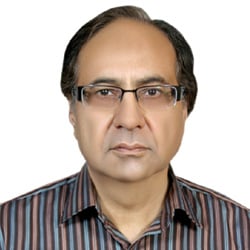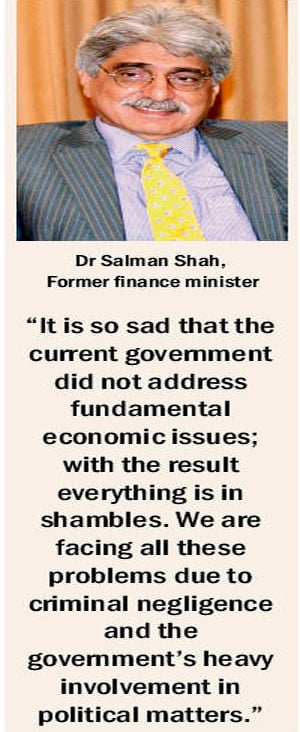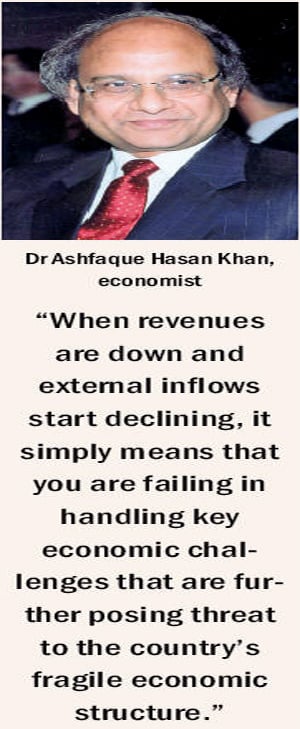The worsening balance of payment is turning into a crisis that urgently needs massive $24 billion external financing to pull through 2017-18. How will the government address this key challenge is anybody’s guess considering the increasing political uncertainty and deep polarisation in the society.
 Senior officials of the ministry of finance and the Economic Affairs Division (EAD) are reportedly hoping to have some adequate external financing from China to help meet their foreign funding requirements. The initial lukewarm response of the World Bank, International Monitory Fund (IMF) and the Asian Development Bank (ADB) does not suggest easy sailing during the current financial year.
Senior officials of the ministry of finance and the Economic Affairs Division (EAD) are reportedly hoping to have some adequate external financing from China to help meet their foreign funding requirements. The initial lukewarm response of the World Bank, International Monitory Fund (IMF) and the Asian Development Bank (ADB) does not suggest easy sailing during the current financial year.
China had extended close to $4 billion in the shape of commercial financing in 2016-17. The Chinese government is said to be again willing to provide such financing worth $2 billion in 2017-18 aimed at easing Pakistan’s external financing difficulties at a time when foreign inflows are declining.
For Pakistan the situation deteriorated when United States government refused to provide any funding under the Coalitiown Support Fund (CSF). Islamabad claims it has still to collect $300 million from the United States as part of the reimbursement. The government needs $8 billion for debt servicing in 2017-18.
The latest estimate proposes that the government may get $12 billion from all sources including the International Financial Institutions (IFIs), foreign commercial banks and bilateral creditors besides having certain foreign direct investment (FDI). The gap still is close to $12 billion, which may not be filled easily; forcing the government to take more external loans on higher interest rate.
Those who are familiar with the working of the ministry of finance and the EAD maintain that things can work out better if early negotiations are undertaken with the IMF to seek another bailout package worth $6 to $8 billion for managing the external sector difficulties.
 The balance of payment position has deteriorated because exports are down by 1.4 percent to $21.7 billion, while imports jumped by 18 percent to $49 billion. In fact these imports have more than doubled due to which trade deficit went as high as $27 billion in 2016-17. The situation turned more serious when for the first time in the last many years, home remittances declined by $1 billion as the $20 billion target was not achieved in the last financial year. The current account deficit may widen further to over $16 billion at the end of the current financial year.
The balance of payment position has deteriorated because exports are down by 1.4 percent to $21.7 billion, while imports jumped by 18 percent to $49 billion. In fact these imports have more than doubled due to which trade deficit went as high as $27 billion in 2016-17. The situation turned more serious when for the first time in the last many years, home remittances declined by $1 billion as the $20 billion target was not achieved in the last financial year. The current account deficit may widen further to over $16 billion at the end of the current financial year.
Dr Ashfaque Hasan Khan, principal and dean, School of Social Sciences and Humanities at National University of Science and Technology (NUST), admitted, “I am really nervous as the economic challenges are multiplying with the passage of every day.”
The renowned economist regretted that nobody in the government, including the finance minister, bothered to take notice of the deteriorating economic conditions, especially the balance of payment position which was turning out to be a big problem in 2017-18.
The government was rudderless, he said, with the result that things were turning from bad to worse. “The government is too busy in its political survival to look after the ailing economy,” Dr Khan said.
The government presented an expansionary budget for FY18, which if implemented in letter and spirit, combined with the inappropriate exchange rate would further fuel aggregate demand; increasing imports.
Dr Khan, who has served as special secretary and director general at the debt office, said he was at a loss to know how the government would improve its foreign exchange reserves, increase home remittances, curtail trade deficit, and manage the widening current account deficit.
“When revenues are down and external inflows start declining, it simply means that you are failing in handling key economic challenges that are further posing threat to the country’s fragile economic structure,” he added.
Former minister for finance Dr Salman Shah was of the view that the Pakistan Muslim League-Nawaz (PML-N) government has wasted four years and did not do anything in terms of improving the struggling economy.
“It is so sad that the current government did not address fundamental economic issues; with the result everything is in shambles,” Dr Shah said, and added that exports were down, imports were surging and balance of payment crisis was getting worse with nobody there to fix these alarming issues.
“We are facing all these problems due to criminal negligence and the government’s heavy involvement in political matters,” he said, and added that finance minister Ishaq Dar was a front man of the ousted prime minister and was still trying to protect his business interests.
He recalled IMF Managing Director Christine Lagarde’s last year visit, when she asked the present rulers to opt for critical reforms without which there was no concept of any development and progress. “But they did not listen to her, and continued the IMF’s three years $6.2 billion Extended Fund Facility (EFF) programme.”
Dr Shah regretted the lack of reforms in the Federal Board of Revenue (FBR), and said this was why the tax body failed to collect sizeable revenues every year. There is a revenue shortfall every year, and the government is avoiding restructuring the entire tax machinery in the absence of which there cannot be any new resource mobilisation.
“I know that the government is in a fix as to how it will manage over $23-24 billion foreign inflow needed during the current financial affairs,” Dr Shah said, regretting that exports and home remittances were declining and the current account deficit continued to widen with none in the government looking into these serious issues.
“Only CPEC (China-Pakistan Economic Corridor) will not do the trick, and the rulers must strive to secure foreign direct investment (FDI) which had been falling for the last many years.” The little job done by former planning minister Ahsan Iqbal with regard to CPEC could suffer after he was given the portfolio of interior ministry about which he does not have any expertise, he said.
The economic scenario is getting too scary - foreign exchange reserves are declining at top speed, current account deficit  jumping to $12.1 billion, exports coming down to $21.7 billion while imports are surging, and trade deficit stands at $26.9 billion in 2016-17. As things are moving at a slow pace, the current financial year is witnessing over $30 billion trade deficit.
jumping to $12.1 billion, exports coming down to $21.7 billion while imports are surging, and trade deficit stands at $26.9 billion in 2016-17. As things are moving at a slow pace, the current financial year is witnessing over $30 billion trade deficit.
The paltry amount distributed in the name of the Rs180 billion export incentive package announced by the former prime minister did not make any difference in terms of promoting the declining exports.
“Here we have been cheated like anything as both Ishaq Dar and Khurram Dastgir continued to refuse to pay back our over Rs250 billion sales tax refunds,” lamented the chairman of the Bedwear Exporters Association, Shabir Ahmad. Had the government returned these refunds, he said the export industry would have been much better off in terms of increasing the country’s dwindling exports.
Ahmad does not believe that the new Prime Minister Shahid Khaqan Abbasi would do any different to help improve the economy, particularly by concentrating on exports which were the lifeline for managing foreign exchange reserves. “I am really disappointed and so is my exporters’ community,” he said, and added that he did not know whether the new commerce minister Pervaiz Malik could deliver either.
“They must deliver which they did not during their last four years term,” he said. The PML-N government should stop taking too much interest in politics and concentrate on reviving the tattering economy. Ahmad was of the view that the new prime minister should now prove his metal by fully concentrating on the economy as he had said immediately after taking oath in the national assembly.
The important question now is how best the government can deal with the frightening balance of payment problem. Regrettably the government did not listen to the views of the independent economists to deal with the issue. But again, why was the IMF keeping quiet and did not raise the issue with the government, especially when the government was under the EFF programme before October last year.
Questions are also being raised why was IMF failing to take notice of other deteriorating economic indicators and kept issuing the certificate of clean bill of health to the economy throughout the twelve reviews of the economy. The fund officials were predicting current account deficit at $4.7 billion, but changed their figures to have the same at $9 billion at the end of May this year.
Now, when the balance of payment problem is getting unmanageable how will the government resolve it and secure additional foreign inflows to avoid a default. Part of the problem is that nobody in the government thought about the burgeoning trade deficit, which is why the external balance looks so scary.
Similarly, no official of the ministries of finance, commerce and EAD bothered to inquire why imports kept surging, from double to a further increase, and now reaching close to $50 billion, a mind boggling figure. Concerned ministers, including Dar and Dastgir kept defending the rising imports by saying it was due to the machinery related to CPEC projects. They refused to accept that there were any other major imports apart from the CPEC-related machinery, and emphasised it was spinning the wheel of development.
The balance of payment problem further worsened when the central bank lost control over the unnecessary increase in dollar that destroyed rupee-dollar parity in the open market as well as in the interbank rate. The finance minister admitted that the abrupt depreciation of Pakistani currency by Rs4 was due to the criminal negligence of the central bank. He also ordered an inquiry, but where is that inquiry report?
IMF had been asking the government to devalue the Pakistani currency, which it said was over-valued.
Now that Dar has again been given the portfolio of the ministry of finance, people do expect him to deliver and deal with the looming balance of payment crisis on priority. Would he do that considering his involvement in politics? He is also faced with the danger of Hudabia Paper Mills case in which he had become approver, but later said his statement was taken under duress.
The ousted prime minister still banks on Dar in terms of improving the economy. He has to deal with serious challenges like deteriorating balance of payment problem, increasing imports and decreasing exports.
At the same time the finance minister would have to place responsibility on those who did not help achieve $20 billion home remittances target set in 2016-17. There is $1 billion decline in remittances and overseas Pakistanis are avoiding remitting money through normal banking channels, and instead preferring hundi and hawala. Will this trend continue? If it does then the finance minister will have to find out a solution by ensuring better rupee-dollar parity both in inter-bank rate and open market rate.
Going forward, the increasing political uncertainty must end and the government must concentrate on the economy. The ruling party has the right to defend its former prime minister by criticising the Supreme Court verdict that disqualified Nawaz Sharif, but can we afford a tussle between the institutions? If the answer is no then better sense must prevail to put the country back on track by improving the overall governance.
Dr Salman Shah,
Former finance minister
“It is so sad that the current government did not address fundamental economic issues; with the result everything is in shambles. We are facing all these problems due to criminal negligence and the government’s heavy involvement in political matters.”
Dr Ashfaque Hasan Khan, economist
“When revenues are down and external inflows start declining, it simply means that you are failing in handling key economic challenges that are further posing threat to the country’s fragile economic structure.”
The writer is a senior journalist based in Islamabad